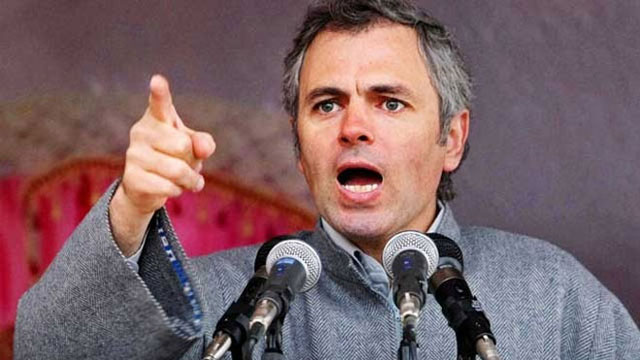Abdullah, who had wanted action against repeated ceasefire violation by Pakistan, now wants dialogue process between the two countries.
We are a young nation. And our cavalry is full of young people. Whenever we discuss about India’s foreign policy, a question features in continuum- Is India a soft state?
Just a few days ago, the writer of this column of this young website was elated that at least somebody was taking a hard stand on Indian governments’ softness against habitual ceasefire offender Pakistan.
On the night of October 21, when Pakistan troops resorted to heavy shelling at Indian positions in R.S. Pura sector of the international border in Jammu district, two BSF jawans died in the attack. Pakistani troops used 82 millimeter mortars and other heavy weaponry to target our positions in Nikkowal and Abdullian areas of R.S. Pura sector.
Ironically, the incidence had taken place just a day after Jammu and Kashmir chief minister Omar Abdullah had said that if Pakistan continues to violate the ceasefire agreement, India would have no option but to respond with force.
Addressing a state police function in Srinagar, Abdullah had said, “In case Pakistan doesn’t respect the ceasefire agreement and continues to violate it, then New Delhi should look for other options… If they (Pakistani troops) violate ceasefire and continue attacks on us, we won’t tolerate it.“
Showing his concern towards his people who have been badly hit by consistent attacks on villages in Samba, RS Pura and Akhnoor, Abdullah had said, “It has made the local people leave their homes, abandon agricultural activities and flee to safer places.”
“Obviously, this cannot be a one-sided affair. It cannot be a situation where we are at the receiving end and no response is given,” he had further added.
Stating that he would ask the Centre to take up the issue with Pakistan, he had said, “Tell them that the answer to shelling cannot be given by words. We do not want to retaliate with the bullet for the larger interests of the civilians living near the LoC and IB, but that does not mean that the answer to the bullet is not the bullet.”
He had added that the “forces behind creating tension on the border… will not be allowed to succeed”.
Stating that India and Pakistan had worked out a mechanism “whereby the DGMOs of the two countries would meet and find ways to deescalate tension on the LoC and IB”, Abdullah had said, “I believe that is an option that needs to be exercised, failing which the Government of India will have to look at responding to the ceasefire violation.”
This was the second time in the last three days that Abdullah has expressed concern over the ceasefire violations on the LoC and IB.
Union Home Minister Sushil Kumar Shinde had visited the affected areas on October 22nd and had held that Pakistan was responsible for the heavy shelling. He had even revealed that Hafeez Saeed was behind all the activities in LoC.
Still, no response came from the Indian side which may have sealed the repeated attacks. However, President Pranab Mukherjee had whipped Pakistani government via an interview, but Abdullah’s was only voice speaking strong words.
But today, Abdullah mellowed his words and changed his stance against Pakistan. He said that he will continue to zaq`bat for resolution of all political issues concerning the State through dialogue as economic development cannot resolve the problem.
“Economic development cannot resolve the basic political issues confronting the State. Three wars between India and Pakistan, resorting to violence by strayed youths and different political voices reverberating across the state are not for development concerns.
“This had all happened and is happening for settlement of the basic political issues plaguing Jammu and Kashmir,” Abdullah told a rally in Bandipora district in North Kashmir after inaugurating a bridge and a mini-secretariat.
“I will continue to bat for resolution of all the political issues concerning Jammu and Kashmir in an amicable and peaceful manner through the process of dialogue,” he said.
Mr. Omar said he will also continue to carry forward the development agenda with full spirit and enthusiasm to mitigate difficulties of the people.
“The resolution of political issues confronting the state is need of the hour and the channels of dialogue need to be kept operative so that peace and development go hand in hand and Jammu and Kashmir becomes a state of peace, prosperity, development and plenty,” he said.
The change in stance may be attributed to the fact that the central government has been re-reiterating on the dialogue process and wants to avoid any situation that leads to war.
But the government has till now showed no intention of serious action against Pakistan. The talks between Manmohan Singh and Nawaz Sharif on the sidelines of UN meet saw some strong words but yielded no results.
Abdullah too had slammed the Sharif government on seeking US intervention in resolving the Kashmir issue. Abdullah had exhorted that Sharif was “guilty of playing to his home audience as he knows that India won’t accept any sort of foreign intervention.”
Given that there have been 108 ceasefire violations by Pakistan this year only, Abdullah’s statement had held merit. The recent attack has made it more than clear that Pakistan is looking for some retaliation by the Indian side.
His change in stance only devalues his own words and disappoints us.





